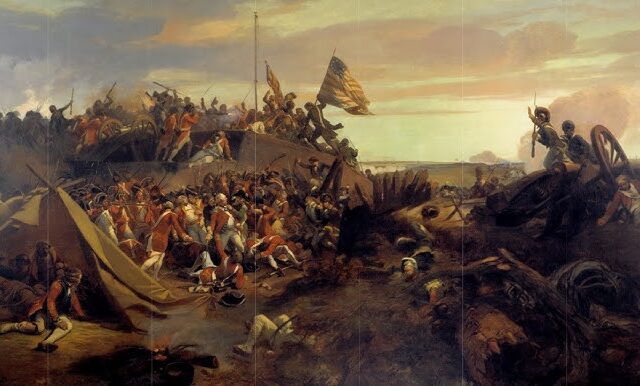SURRENDER. Copyhold property is [ transferred from one person to another by surrender and admittance. The property is surrendered into the hands of the lord of the manor to the use and behoof of the puchaser. A surrender may be made either in court, or out of court. The actual surrender is usually preceded by a covenant to surrender. For further information, see Copyhold. By the Stamp Act, 1891, the stamp duty is:
Surrender— Of copyholds. See Copy-hold.
Of any other kind whatsoever not chargeable with duty as a conveyance on sale or a ;^ 5. d. mortgage 10
The following are examples of (1) a simple surrender ; (2) admittance : [SURirrender combined with Surrender. Manor of i Be it remembered that on rthe day of 19 ‘ A B one of the Copyhold Tenants of the said Manor came before Steward thereof and in consideration of the sum of £ to the said A B paid by the said C D on or before the passing of this surrendor out cou’^r” ‘^^” * Surrendered into the hands of the Lord of the said Jordanian by the hands and acceptance of the t Rod, glove, or Said Steward by the f other emblem. according to the Custom of the said Manor All etc. with the appurtenances To the use of the said C D his heirs and assigns at the will of the Lord according to the Custom of the said Manor at and under the rents suits and services therefor due and of right accustomed. This Surrender was taken and accepted by me this day of 19 Steward.
Surrender and Admittance.
Manor of 1 The Customary Court etc. of I Lord of the said Manor holden at within the said
manor on the dav stamp. of 19 Before Steward.
To this Court came A B and Last admittance did Surrender into the hands 19 of the Lord of the said Manor All that Cottage Rent ‘ ”’ etc.
Fine of the Yearly Copvhold Rent of ” To the use and behoof of C D his heirs and assigns for ever
according to the Custom of the said manor (in consideration of the sum of £ to the said A B paid
by the said C D) (or as the case may be) And thereupon to the same Court came the said C D
and took of the Lord of the said Manor by the hands of his Steward the said Cottage aforesaid witli the appurtenances To hold the same to him his heirs and assigns for ever according to the Custom of the said
Manor Paying the Rents and performing the Services of Right due and accustomed and having paid the Lord for his Fine as in the margin and done his fealty is there upon admitted tenant by pledges of E F and G H. J. K., Steward.
SURRENDER VALUE. The amount which an assurance company will pay, after, say, two or three years premiums have been paid, to the holder of a life policy, upon a surrender of the policy. An advance should not, as a rule, be made upon a life policy beyond the amount of the surrender value.
A banker can ascertain the surrender value by applying to the assurance company.
A life policy may often be sold at rather more than the surrender value. (See Life Policy.)
SUSPENSE ACCOUNT. Items which, for one reason or another, cannot be passed at once into the account to which they ought to go, are, in the meantime, debited or credited, as the case may be, to a suspense
account. A cheque which is sent direct by one bank to another for collection and payment over, is, in some banks, debited to such an account until advice of the payment is received.
SUSPENSION OF PAYMENT. A debtor commits an act of bankruptcy if he gives notice to any of his creditors that he has suspended, or that he is about to suspend, payment of his debts. (Bankruptcy Act,
1883, Section 4, s.s. 1 (h).) (See Acts of BANKRUPTCY.)
SUSPENSION OF THE BANK ACT. The Bank Charter Act, which imposed certain restrictions upon the issue of Bank of England notes, has on three occasions been suspended or set aside by the Government
authorising the Bank to issue notes in excess of its authorised issue. The occasions were the monetary crises of 1847, 1857 and 1866, and in each case the suspension of the Act allaved the panic. (See Bank Charter Act.)



MOST COMMENTED
Titles of States
World Court Publicated
For Money Lent, Paid, Received, or Due on Account / No. CLIX / No. LXI. / No. LXII. / rdfi / rdfi / rdfi / Titles of States / Valuator GOVERNMENET PRINTING
Combat Zones Earth
Titles of States
Earth listing of serial number of the stamp.
Titles of States
Interlineation Stranger
Titles of States
Associate Title Agency
Titles of States
War Of Finance
Titles of States
Nuska Control Centers